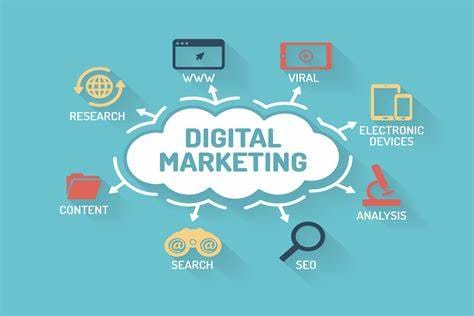
Digital marketing refers to the promotion of products, brands, or services using digital channels such as search engines, social media platforms, email, and websites. It involves using digital tools and techniques to reach and engage with target audiences, build brand awareness, drive traffic, generate leads, and ultimately, drive sales and revenue.
Some common digital marketing channels and techniques include:
- Search Engine Optimization (SEO): Optimizing website content to rank higher in search engine results pages (SERPs).
- Pay-Per-Click (PPC) Advertising: Creating and publishing online ads that are paid for each time a user clicks on them.
- Social Media Marketing: Using social media platforms like Facebook, Twitter, Instagram, and LinkedIn to promote products or services.
- Content Marketing: Creating and distributing valuable, relevant, and consistent content to attract and retain a clearly defined audience.
- Email Marketing: Sending targeted and personalized messages to customers or prospects via email.
- Influencer Marketing: Partnering with influencers who have a large following on social media to promote products or services.
- Affiliate Marketing: Partnering with affiliates who earn commissions by promoting products or services.
- Video Marketing: Using video content to promote products or services on platforms like YouTube, Vimeo, or Facebook.
- Mobile Marketing: Using mobile devices to promote products or services through SMS, MMS, or mobile apps.
- Analytics and Reporting: Measuring and analyzing the performance of digital marketing campaigns using tools like Google Analytics.
Why is Digital Marketing Important?
- Wider Reach – Unlike traditional marketing (TV, radio, print), digital marketing allows businesses to connect with a global audience.
- Cost-Effective – Running ads online is often cheaper than traditional advertising methods.
- Targeted Marketing – Digital marketing allows businesses to target specific demographics, interests, and behaviors.
- Data-Driven Insights – Marketers can track and analyze user behavior, engagement, and conversion rates.
- Improved Customer Engagement – Real-time interaction with customers through social media, email, and chatbots.
Key Components of Digital Marketing
- Search Engine Optimization (SEO)
Improves a website’s visibility in search engines like Google.
Uses techniques such as keyword optimization, backlinking, and content quality.
Helps attract organic (unpaid) traffic.
- Content Marketing
Involves creating blogs, videos, infographics, e-books, and podcasts.
Engages and educates potential customers.
Builds brand authority and trust.
- Social Media Marketing (SMM)
Uses platforms like Facebook, Instagram, LinkedIn, and Twitter to promote brands.
Engages users through posts, ads, and influencer collaborations.
Encourages direct communication with customers.
- Pay-Per-Click (PPC) Advertising
Paid advertisements on platforms like Google Ads and Facebook Ads.
Businesses pay only when users click on their ads.
Provides instant traffic and results.
- Email Marketing
Sending personalized emails to leads and customers.
Used for promotions, newsletters, and customer retention.
Automation tools like Mailchimp make campaigns more effective.
- Affiliate Marketing
Businesses partner with affiliates who promote their products for a commission.
Common in industries like e-commerce and online courses.
Involves influencers, bloggers, and website owners.
- Influencer Marketing
Collaborating with social media influencers to promote a brand.
Influencers have a loyal following and can drive engagement.
- Mobile Marketing
Reaching customers through mobile apps, SMS, and push notifications.
Ensures marketing messages are accessible on smartphones and tablets.
- Analytics & Data-Driven Marketing
Tools like Google Analytics, Facebook Insights, and CRM software help track campaign performance.
Helps businesses refine their strategies for better ROI.





